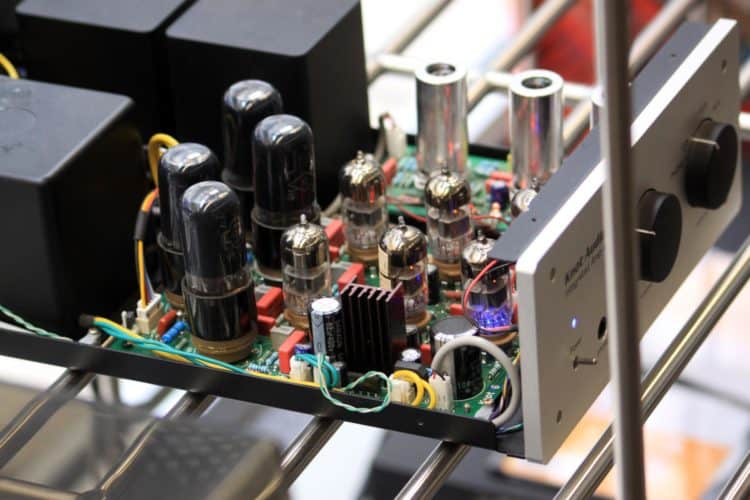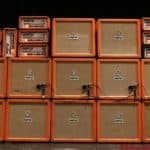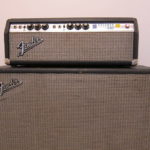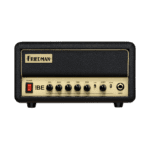A lot of people will tell you that tube amps are louder than solid state amps and watt for watt, they kind of aren’t, well depending on who you ask.
According to some, it’s a trick of the ear and according to others, it’s about power output.
Tube amps sound louder than Solid Amps in general, a smaller tube amp (10-15 Watts) will usually be as loud as or louder than a Solid state amp of up to 50 watts. This is because tube amps are more efficient at delivering their power than solid state amps that have increased speaker impedance.
In other words, the tube amp is slightly louder because the wattage is converted to a slightly higher decibel output (3-10dB) and at the same time, the slight distortion leads to harmonics that are picked up by your ear, telling you there’s more sound.
Are tube amps louder than solid-state ones of the same output power?
Yes, they are. Very minorly though, so minorly that it becomes a matter of opinion unless both amps are either cranked or you’re testing it with equipment instead of the human ear.
Some speculate that part of this is a design decision made by amp manufacturers, being that a lot of Solid State amps are on the low end of the price range and are designed for bedroom players. Tube amps are generally pricier and considered to be gigging amps.
According to some, this has meant that manufacturers made tube amps more sensitive to power input and specifically designed them to be played at full volume. This might explain why tube amps have less of a consistent tonal range at lower volumes.
But whether that’s true or not, the question is what makes them louder?
What makes tube amps louder than solid-state ones?
Speaker impedance seems to be the culprit here. Speaker impedance, which is the amount of resistance a speaker (or circuit) gives to the current flowing through it, depends on the nature of the frequencies the speaker is reproducing.
The hard clipped signal that Solid State amps produce greatly decreases the available power, giving them a higher speaker impedance and less overall power. Tube amps, in contrast, generally produce between 80% and 90% of their power regardless of frequencies.
The tones produced due to how valves/tubes produce sound are also considered less harsh on the ear, making them more tolerable at higher volumes. I think this owes a little to the subtle harmonics produced by the natural distortion in the valves, as opposed to the digitally clipped sounds of a Solid state amp.
How much louder are tube amps?
Considering that even small Tube amps are made to be loud, you’ll often find that a 10-watt tube amp can hold up against a 50-watt solid state amp. This isn’t so much because it’s actually measuring higher on the dBs but rather because it handles higher volume better.
The tube amp is technically not louder than the solid state amp, it’s just better at handling the higher volume and higher power output.
If you were to take the two amps at the same power output level. Two 15-watt amps for instance and play them side by side, what you’ll find is that as both amps get louder, the tube amps tend to start sounding better and the solid state either stays the same or gets worse.
And this is really the core of why people find tube amps to be louder despite lower power, the tubes handle that high volume better. In other words, they have a better capacity for their overhead/headroom.
Is it all about the overhead?
Overhead simply refers to the capacity an amp has for higher volumes before it starts to become overdriven. It’s like having gas left in the tank.
The concept goes that if you play a 15-watt and 30-watt amp together, the 15-watt will actually be quite close to as loud as the 30-watt, but that the bigger amp will handle the higher volume better.
This matters a lot in guitar playing, but it’s not all about the overhead. Tube amps definitely deliver more in this department, meaning that they can handle higher volumes the best. But that comes at the cost of consistency at lower volumes.
This brings us to the next question.
Do tube amps always sound better?
Not always, no.
They’re generally not good at lower volumes and that tends to be the biggest peeve that most players have with their valve amps. When it comes to sound consistency, tube amps just aren’t known to be good bedroom amps.
Solid state amps have the upper hand in this department and while they may not be great for being loud like the tube amps are, they’re definitely great across their range of volume. Except at the very top.
The reason why tube amps aren’t so good when soft is because of the way that the tubes work. Tubes require a bit of heat to produce that warm and slightly distorted sound they’re known for, and this means a higher voltage.
How does one get a higher voltage? Generally, not at lower volumes, that’s for sure.
I will say, however, that some amp manufacturers have made a work-around for this issue and have fitted modern tube amps with attenuators.
These devices take the amp signal and dampen it, so that the output is lower, even though the input is high enough to heat the valves.
You may not have an attenuator built-in to your amp, but you can have one fitted and this generally gets around the low volume, low sound quality problem of tube amps.
Another thing to consider is that consistency of tone is sought after in different genres.
Blues and rock guitar players love the natural sound of tube amps, but Jazz and metal players are often more drawn to Solid State amps.
Even an attenuator won’t cover that, because all it does is give distortion at lower volumes, but that natural inconsistency in the tube amp is still there.
Why you might prefer a solid state amp
It really is a preference thing, as so much of this stuff is. If you’re more into Jazz, you’re going to want a Solid state amp.
They’re better for clean tones at higher volumes and their distortion is based on a switch rather than on a set of vacuum tubes.
I find that some solid state amps are great for playing metal and punk because you want that nasty crunch and clarity that solid states provide.

Hello there, my name is Ramiro and I’ve been playing guitar for almost 20 years. I’m obsessed with everything gear-related and I thought it might be worth sharing it. From guitars, pedals, amps, and synths to studio gear and production tips, I hope you find what I post here useful, and I’ll try my best to keep it entertaining also.





